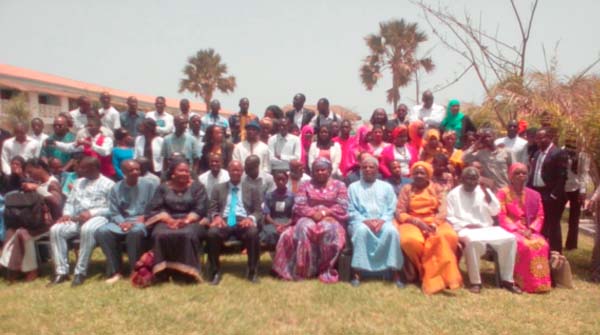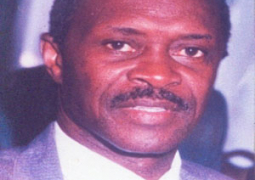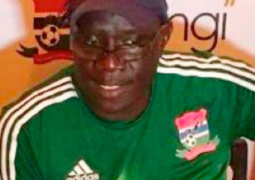
The
United Nations Educational Scientific and Cultural Organization UNESCO Regional
Office in Dakar, in collaboration with The Gambia National Commission for
UNESCO, Article 19 and CODESRIA, yesterday opened a two-day International forum
for Africa’s youth to learn lessons.
The
youth power that put an end to The Gambia’s political Impasse, which restored
democracy in the country, was top of the agenda.
The
theme of the international forum is “Youth Peace Building and Regional
Solidarity: Lessons from Africa” built on the concept that since wars begin in
the minds of men, it is the minds of men that the defence of peace must be
constructed.
The
overall goal of the initiative is to strengthen capacity within the youth to
lead actions at both the community and national levels.
The
conference also sought to provide a platform for sharing experience, lessons
learned and reflections on the role of the youth in the democratic transition
in Africa.
The
participants were drawn from across the sub-region to discuss the issues
affecting them as well as to learn from the youth power that restored democracy
in The Gambia in ending the political impasse.
In
her remarks on the occasion, Basic and Secondary Education Minister Claudiana
Cole said: “It is an honour for me to address you at this conference on the
theme: youth, peacebuilding and regional solidarity.
“First
and foremost, allow me to register my sincere thanks and appreciation to the
conveners of this important conference for bringing together young people from
the African continent and providing a platform for them to share their varied
experiences and reflect on their role in the democratic transition and positive
social transformation in Africa.”
She
said the conference was particularly timely and relevant considering the recent
developments in The Gambia and in many other African countries.
She
said: “Our country has just emerged from 22 years of repressive rule that was
characterized by indescribable restrictions and violations of basic human
rights.
“The
peace and tranquility of our nation and even that of some neighbouring
countries were seriously undermined. War, social unrest, ethnic, tribal and
religious intolerance loomed large on our country’s horizon.
“This
situation is not peculiar to The Gambia, as many other African countries are
still facing complex political and transitional challenges that require special
attention.”
“While
we are pleased and grateful to the youth for their remarkable capacity to
contribute to peace building and prevent conflicts; there is more work to be
done to galvanize their participation and engagement in the process of ensuring
sustainable peace in Africa.
“We
must ensure that the youth play a fundamental role in decision-making processes
and other sources of empowerment. Youths need specific knowledge, skills, and
attitudes to build a lasting peace.”
Madam
Cole further stated that “the new Government of The Gambia is committed to
providing the necessary space and guidance to its youthful population in all
spheres of national development.
“We
recognize the need to empower a new generation with new intercultural skills; a
deeper media and information-technology-literacy to support the positive civic
engagement of young people and youth initiatives.
“We
must also support a cohesive society to advance peace on the basis of respect,
human rights and dialogue.”
Ebrima
Ceesay, from African Artist Peace Initiative, said that on a continent where
the majority of the young people are under the age of 35, young people are
excluded from political leadership and decision making processes.
He
said young people are marginalized in national politics, adding that they have
an older generation in possession of authority seeking to address issues
affecting young people without consulting them.
He
added that these efforts are bound to fail. He said five years ago the African
Union convened a summit in Malabo on the theme of accelerating youth
empowerment for sustainable development.
He
said, “One of the resolutions of that meeting was the commitment by AU heads of
states to reduce youth unemployment by 2% every year.”
He
said not only have they failed to reduce youth unemployment by 2% every year
but in fact youth unemployment has been on the increase every year in
double-digit percentages.
Maimuna
Sidibeh of the UNESCO Gambia Office said, “It is with singular honour and
profound privilege that I welcome our international delegates and guests to
this country known as the smiling coast of Africa.”
She
said the event marks yet another milestone in the Gambian calendar to
deliberate on issues affecting African Youth.
She
also said The Gambia recently witnessed historic changes and “not by accident”.
She
added that UNESCO decided to invite the participants in the country and that
youth peace building and regional solidarity has never been more relevant and
critical.
Other
speakers at the event were Sports PS Nancy Nyang, Dr Mariama Touray Jagne and
Madam Fatou Jagne-Senghore of Article 19 among others.
Among
the dignitaries present was Demba Ali Jawo, Minister of Information, and Hon.
Halifa Sallah, Vice Chancellor of UTG among others.



